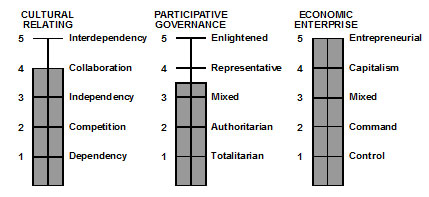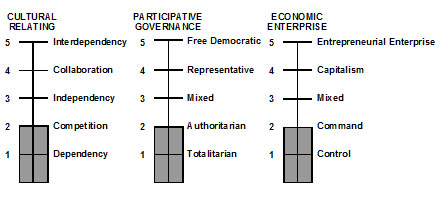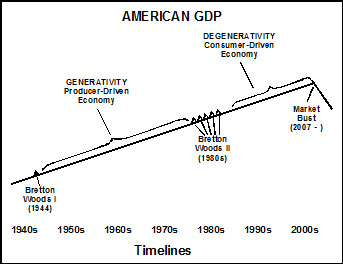Cultural Generativity*
On Flag Day, June 14, 2004, I addressed the first “Freedom-Building Conference” in McLean, Virginia. I remember it well because Flag Day is my birthday. At that time I expressed my disappointing projections of the Bush administration’s functioning on the empirically-validated “Three Factors of the Freedom Experience”:
- On Cultural Relating, I projected a disastrous decline from Collaborative Relating to Dependent Reactivity.
- On Participative Governance, I projected a precipitous plunge from Democratic Participation to Totalitarian Socialism.
- On Free Enterprise Economics, I projected a desperate fall from Entrepreneurial Capitalism to a Command-and-Control Economy.
To my dismay, all of this has to come to pass.
Perhaps the greatest culture shock in the last 100 years of America was experienced by its citizens in the presidential term of George W. Bush. From an administration that began with the mission of “Compassionate Conservatism,” this administration devolved to one that emphasized “Passionate Despotism.”
Bush’s “Compassionate Conservatism” was to be found in the following “Pre-9/11” goals reflecting his principles:
- Improving the lot of the underprivileged;
- Improving our international relations;
- Reducing government, taxes, and bureaucracy;
- Transforming our national defense structure;
- Engaging in bipartisanship, which had characterized his governorship in Texas.
Bush was to abandon all of these goals.
* Carkhuff, R. R. Cultural Generativity, Chapter 6. Saving America. Amherst, MA: HRD Press, 2010.
“Post-9/11” changed everything. Bush had become “The Wartime President.”
- His flagship legislation, “No Child Left Behind” proved a sham in practice.
- His humility in international relations succumbed to the totalitarianism of the neo-conservatives.
- His libertarian intentions were deformed by profligacy in spending, which resulted in larger government and massive debt and deficit.
- His commitment to security was undermined by a “hard-wired bureaucracy” that could not manage the extraordinary defense budgets it received.
- His bipartisan intentions were destroyed by Machiavellian manipulations which produced governance bitterly divided by partisan politics and petty prejudices.
Bush failed on all of his goals.
We, the American citizens, suffered the consequences. When we analyze the characteristics of The American Experience that made us Peaceful, Participative, and Prosperous, we conclude the following about Bush’s administration:
- He undermined the uniquely-American Entrepreneurial Capitalism that made us prosperous by conducting a Totalitarian Socialistic Government in the service of the Multinational Corporations that he believed he required in his capacity as “Wartime President.”
- He eliminated the uniquely American balance of powers that enabled a Participative Democracy by ruling by edict and intimidation, assuming the powers of Congress, and politicizing the decisions of the Supreme Court.
- Perhaps most disastrously, he transformed our uniquely American “melting pot of cultural relations” back again into a “boiling cauldron” by pouring salt on the wounds of ancient prejudices and hatreds with “divide and conquer” strategies.
Yes, we American citizens know first hand what culture shock is all about!
Cultural Functions Ratings
U.S.A. 2000—The Producer Culture
Over the last century, then, the U.S.A. defined the emerging requirements of The Global Marketplace:
- Free Cultural Relating,
- Free Participative Governance,
- Free Enterprise Economics.
These are the requirements for entry into the 21st century marketplace. They also define the American Mission. Historically, this is how the U.S.A. was rated by subject-matter experts in 2000.
Cultural Relating
Simply stated, a nation must relate culturally—within, between and among cultures—in order to join The Global Marketplace. American leaders have always set their goals high on Cultural Relating (see Figure 1). Even transitionally, when they retreated to independency or competitiveness, they never surrendered the ideas of collaborative relating. While their definitions of interdependency may have been limited, they were nevertheless striving toward it.

Figure 1. U.S.A. Levels of Cultural Functions (2000)
In 2000, the U.S.A. was rated at level 4.0 on Cultural Relating, reflecting its commitment to collaboration without real motivation for interdependency (perhaps as a function of the conflict of individualism with consensus), except within rare homogeneous cultural groupings.
Mixed Governance
The U.S.A. has also been dedicated to Participative Governance at high levels. While its citizens are guaranteed pre-potent policymaking functions by the U.S.A. Constitution, its representative democracy often migrates into a “role reversal” where citizens serve politicians and bureaucrats. Nowhere has American promotion of democracy been more problematic than in attempts to impose it upon foreign cultures. Participating begins with relating to other’s frames of reference before empowering them to achieve their own enlightened purposes. That is the true nature of democracy. There is no enlightenment without empowerment! There is no empowerment without relating!
In 2000, the U.S.A. was rated at level 3.5 on Participative Governance (see again
Figure 1), reflecting the inconsistent nature of its attempts at making representative governance work; stumbling that led precipitously to representative self-aggrandizement; stumbling that yields disastrously to authoritarianism by default.
Entrepreneurial Enterprise
The U.S.A. has been dedicated to Economic Enterprise at the highest levels. Succinctly, the U.S.A. Constitution, protecting private property and, in an amended form, civil and economic liberties, provides a strong foundation for the nation’s free and dynamic economy. In addition, the U.S.A. has taken the leadership in promoting free trade, not only with neighbors in the Western Hemisphere but with nations around the world. While not yet having realized its mission of Universal Free Enterprise, the U.S.A. has been the world leader, par excellence.
In 2000, the U.S.A. was rated at level 5.0 on Economic Enterprise, reflecting its aspirations for entrepreneurial enterprises and reciprocal trade at the highest levels (see again Figure 1). “The Producer Culture” continued on its path in spite of the influence of “The Consumer-Driven Culture.” Whatever the obstacles, there would be no vision of The Global Marketplace without America’s highly entrepreneurial leadership; there would be no standards for prosperity and, thus, for the evolution of world civilization!
To sum, in 2000, the U.S.A. received relatively high ratings on The Freedom Functions:
- Collaborative Relating,
- Mixed Representative and Authoritarian Governance,
- Entrepreneurial Enterprise.
The good news was that, however “ugly” externally, the U.S.A. continued to relate collaboratively internally and with friends and neighbors. Moreover, the U.S.A. was convergent externally and internally with its path-finding Free Enterprise Mission. The bad news was attempting to project a democratic image in an authoritarian manner externally, while meaningful participative governance was dissembling internally.
U.S.A. 2008—The Consumer Culture
Once again, over the last century, the U.S.A. defined the emerging requirements of The Global Marketplace:
- Free Cultural Relating,
- Participative Governance,
- Entrepreneurial Enterprise.
These are the requirements for entry into the 21st century marketplace. They also define the American Mission. Currently, the same subject-matter experts gave very different ratings in 2008.
Competitive Relating
In 2008, the U.S.A. is rated at level 2.0 on Cultural Relating (see Figure 2). This reflects her growing suspicion and hostility following the 9/11 terrorism attacks and her inability to translate “spy in the sky” intelligence data into meaningful “feet on the ground” information upon which she could base strong and operational security systems. In the absence of operational thinking systems, America writhed in agony and engaged in random, non-responsive and inappropriate initiatives emphasizing cultural competitiveness and the resultant cultural dependency reactions.

Figure 2. U.S.A. Levels of The Freedom Functions (2008)
Authoritarian Governance
In 2008, the U.S.A. is rated at level 2.0 on Participative Governance (see again Figure 2), reflecting the increasing totalitarianism of the party in power and the reactive authoritarianism of the opposition: rather than being consulted as the constitutionally-mandated policy-makers, We the People, the citizens, feel imposed upon by the authoritarian inquisition: Either _______ or _______!
“Either you are a patriot or you’re disloyal!”
“Either you are liberal or you’re prejudiced!”
Command Economics
In 2008, the U.S.A. is rated at level 2.0 on Free Enterprise (see again Figure 2), reflecting its shift in government sponsorship from a vision of an entrepreneurial-driven free enterprise system to government-reinforced multinational corporations, which by their very nature conduct “Command-and-Control Economics.” In spite of their origins and support from American Freedom Functions, the Totalitarian Multinationals relate monopolistically and attempt to reduce their markets to dependency upon “Command-and-Control Strategies.”
In summary, it is clear that America had indeed taken a “U-Turn on The Freedom Road.” America received low ratings on Cultural Relating, Free Enterprise, and Participative Governance. Under the administration of Bush II, the newly-minted Government- Reinforced Industrial-Military Complex (or “GRIM Complex”) has placed America’s citizenry as well as American destiny at risk.
- Competitive and Dependent Cultural Relating placed Peace at risk—internally within the nation and externally in the Global Village!
- Authoritarian and Totalitarian Governance placed Participation at risk—internally within the nation and externally in Global Governance and the Courts of Law and Justice!
- Command-and-Control Economics placed Prosperity at risk—internally within the nation and externally in the Global Marketplace!
In transition, Peace, Participation, and Prosperity are the historical functions of “The Producer Culture.” Americans are placed at risk by “The Consumer-Driven Culture” which now accounts for 70 percent of GDP
From Generativity to Degenerativity
Perhaps the greatest impact upon American generativity and innovation was the shift from a producer culture to a consumer culture. The producer-driven economy generated five decades of incredible economic growth. In turn, when converted, the consumer-driven economy led to the current economic bust.
How this came about is a complex tale of political economics. Why it came about is the more profound issue, for it had disastrous impact upon the American economy and its people.
Recall that America was rolling to victory in Europe and Asia when in 1944 the first Bretton Woods Conference was held. The result of this conference was to establish the American dollar as the universal standard for all currencies. The dollar, in turn, was backed by its own standard, “The Gold Standard.”
The Generativity Curve
World War II had unleashed the awesome productivity of the American people. Indeed, as much as anything else, America’s soldiers were successful because of America’s accelerating manufacturing capacity, which provided the armaments and logistical support to the fighting men. It was a tribute to this very same morale, motivation, and mentality that warranted the Bretton Woods I concession. It tapped into the work ethic and fighting spirit of American men and women, many of whom were first generation Americans.
Indeed, it defined and reinforced a producer-driven economy that out-produced the world, not just in goods and services but in creativity and solutions. The American system was a “groove” for the producer mentality. In the 1950s, companies like IBM exempli¬fied “The Golden Age of Industry” with “The GIC System”:
- Generators made “breakthroughs” at The Watson Center.
- Innovators made “applications” at Advanced Systems Development.
- Commercializers made profits with their ubiquitous marketing arms.
The Generators, Innovators, and Commercializers related together interdependently in “The GIC System.” Each component had its own unique functions. Yet, all components were committed to integrating their individual contributions into the company mission. Their motto was “THINK!” Recognizing that all stood together or all fell apart, they prospered as the leaders of “The Golden Age of Business for America.”
As may be viewed in Figure 3, the producer-driven economy, led by Generators and Innovators, led the market on an elevating and escalating curve of growth. The people prospered and, indeed, flourished in generating their own unique American culture exem-plified by the following conditions:
- Cultural relating transformed America from a “boiling cauldron” to a “melting pot” and provided the human capital support for “The Production Machine.”
- Participative governance transformed Americans from the dependent minions of autocratic Anglophiles to the enlightened citizens of a transparent and accountable government.
- Free enterprise economics transformed Americans from extensions of their own industrial machinery to entrepre¬neurial capitalists in a Generative economy of their own making.

Figure 3. The Effects of Interventions Upon Generativity
Degenerativity
Things were looking great when some of America’s alleged leaders overstepped their political boundaries. During the 1980s, in their conflict with the Soviet Union for world domination, they began to negotiate deals with nations around the world. In the heat of passion, Kissinger’s pragmatism replaced Reagan’s idealism: in so doing, it transformed Reagan’s divine mission into “a little for you and a little for me” diplomacy:
Adopt democratic governance and defeat communism and you will grow rich as our trading partners.
There was only one problem—a huge problem! The countries of the world wanted to trade only if they had a positive trade balance. It was left to America to choose: between demonstrating and dominating; between leading and saving the world; between capitalism and ideology; between prosperity and “faux prosperity.” America chose poorly!
In the 1980s and early 1990s, there were a series of conferences between America and its leading trading partners. Informally, these meetings may be labeled “Bretton Woods II,” although American leaders ignored the same ideology they were exporting: the American citizenry did not participate in the non-transparent decision-making; the American people did not understand the cost of “The Free Enterprise Vision.”
The sum of Bretton Wood II was this: America continues to trade at a deficit and its trading partners initiate to buy their debtor bonds. Initially Japan, and now China, have assumed the leadership role of creditor bond-buying nations. “It was a good deal for the peasants,” our Ivy-League leaders concluded.
The net of the initiatives of Bretton Woods II was to transform American culture from a producer culture to a consumer culture. The “good deal” was that Americans could purchase things at the cheapest prices in the world and consume more than any people in the history of the world. All questions were answered with the basic Walmart question: “Do you like the prices, or what?”
The long-term problem was this: when we changed the culture, we changed the character of the American people. The older generations were confused and disoriented. Were we supposed to model ourselves after scientists, teachers, and mechanics who pur-sued knowledge and empowered expertise? Or were we supposed to model ourselves after businessmen and traders who pursued only profits and produced only cheap goods? The younger generations were to answer these questions.
Almost instantaneously, the younger generations were impacted by the “one-trial conditioning” of the ubiquitous media campaign: “Make More and Pay Less!” They bought whole-hog the assumptions of consumerism as the driving force in the marketplace. Indeed, they made it into the ethic of their generation. To be sure, they labeled it “The Consumer Ethic.”
Some of us in the older generations lost contact with this new ethic. We thought that we had to learn some substance and produce something of value. We thought that we had to demonstrate that the way of American productivity was the best way: the healthiest way, the most civilized way, the most moral way in the sense of the Judaic Christian work ethic upon which this country was built. We believed that we would lead the world by producing—not by consuming!
Like “a shooting guard without a conscience,” the younger generations applied the ethic “Buy!” It was the answer to every market explosion: “Buy!” Indeed, it was the answer that Bush II gave to the market depression: “Buy!” To be sure, “The New Buyology” is the answer we hear to our current economic depression: “Prop them up so they can buy things up.”
It is the death gurgle of a dying civilization: “Buy!”
We desperately need a Bretton Woods III: to install the producer engine of economic growth; to drive consuming by producing; to generate possibilities and produce probabilities.
Historically designed as an “ideology of redistribution” in reaction to the monopolistic ownership of static resources by monarchies of the past, socialism is misaligned with the futuristic requirements of our world and the growth needs of its civilizations.
Advanced civilizations have discovered that “True wealth is in the ideation generated by Human Brainpower,” the very expression of which socialism seeks to control. Concur-rently, Free Enterprise is the only system available for the generative potential of Human Brainpower.
In summary, culture has been defined historically by the traditions and values from the past. As such, culture is held together by conditioned responding systems where people ritualistically pay homage to these traditions and unthinkingly perform its valued practices.
Here at the beginning of the 21st century, we have crossed these tradition-bound thresholds. Now our cultures are defined by the requirements of the future. Paramount among these requirements is Generativity: there is no longer any place for non-thinking reverence to the past.
Healthy people now live in a “Culture of Change.” We prepare to live in such a culture with our thinking skills. We prepare to define such a culture with our generativity skills.
In this context, there is no place for a socialist philosophy from the past. Socialism had its place in reaction to the monopolistic monarchies of primitive times: it sought to redistribute assumedly finite natural resources to the peasants.
We are of a time and place where the most enlightened among us understand the pre-potency of human brainpower as “the natural resource.” Concomitantly, we define our Free Enterprise Systems to relate, empower, and release others to actualizing their potential.
In transition, socialism is handicapped by its inability to generate wealth. The credo of Free Enterprise is this: We cannot redistribute what we did not generate!
Finally, socialism yields an “economy of scarcity,” designed for a static world condi-tioned by diminishing resources.
Free Enterprise generates an “economy of abundance” designed for the spiraling productivity of our continuously-changing Global Village and its expanding marketplace.
